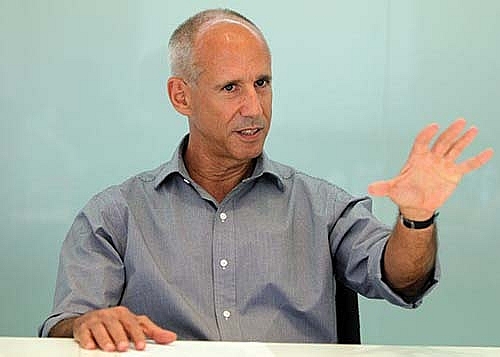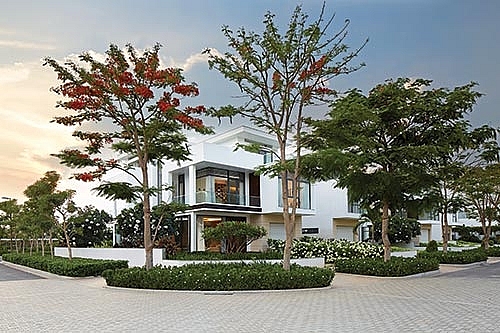Indochina Capital carves a niche
 |
| The real challenge in high-end real estate development is you have to do it right |
Gazing through the wide glass windows of the Indochina Capital office, Peter Ryder gestures to the construction of a station for Hanoi’s future elevated rail line and recalls what was only considered a dream five years ago. “When we first imagined the Indochina Plaza Hanoi with a rail line in front of it, people asked me ‘Do you really think it will happen?’”
Despite the doubt, Ryder had faith that the rail line would be realised. “And it is actually happening right now,” the CEO of the investment banking and real estate development company said with pride. Indochina Capital successfully built the Indochina Plaza Hanoi before the Nhon-Cat Linh rail line even started construction.
What many local buyers didn’t realise is how the rail line would affect the value of the properties along it. Ryder said this is largely because most Vietnamese have never had experience with an elevated rail line or metro before. But the American investor is sure the value of the property will skyrocket once the station out front welcomes its first train.
Believe in what others don’t
Only time will tell whether Ryder’s gamble will pay off, but his belief in a streamlined rail system has now been realised. When the real estate market fell into crisis the fate of the project was in the balance, many people weren’t sure the firm could sell apartments at more than $2,500 per square metre, but out of 386 units total, only eight remain available. Buyers snapped them up at a time when other high-end projects were showing pitiful sales results, and within a short time 340 buyers and tenants have moved into the building.
At the time, when other developers were wondering whether they should invest in shopping centres as apartments were in the doldrums, Indochina Capital had anticipated this trend with a retail podium that was faring well. Global brands such as Pizza Hut, Burger King, Dunkin Donuts and Starbucks have all selected the building as a port of call. “I can say that despite market conditions posing a challenge, we have now gained momentum in our retail component, which is poised to really take off in the next 12 to 24 months,” Ryder claimed.
The Hanoi complex was not the only bet that paid for Ryder, Indochina Capital has invested in a handful of projects that people have deemed ‘risky’. Three years ago, when the real estate market was well into its recession, Indochina Land - the real estate division of Indochina Capital - made a splash when it spent just tens of millions acquiring a villa project in Ho Chi Minh City’s District 9. Some were aghast as the firm traditionally focused on projects in urban centres. At the time District 9 was just an unknown suburb of the city. But Indochina Land didn’t think twice, the company bet the area would flourish once the infrastructure improved. “We monitor the progress everyday and we see progress everyday,” stressed Ryder.
As Indochina Land is going to launch the project under the Eden brand next week, new infrastructure is now in place. The project is well positioned near Long Thanh-Dau Giay Highway, which is scheduled for completion at the end of this year. Other roads and the Thu Thiem Tunnel are also in place, which will shorten the commute from Eden to downtown to 10-15 minutes. Thanks to improved infrastructure Eden has sold a dozen villas before the official launch, and Ryder noted that prices were going up month by month. “In the soft launch phase we have significantly exceeded what we paid for the project and have achieved profit,” he said.
 |
| Eden, another quality development by Indochina Land, will be officially launched this month |
The advantages of the first mover who dares to take risks
Indochina Land was one of the first of the several pioneering developers to capitalise on the booming infrastructure development of Hanoi and Ho Chi Minh City which has been described by CBRE managing director Marc Townsend as a catalyst for real estate market growth in the coming time. But Indochina Land did not wait for infrastructure to be complete ahead of investors, instead it invested in areas other saw as risky, and for less.
Its pioneering business approach has paid off. To date the company has sold nearly $400 million of residences with strong sales despite the crisis. In 2006, when the Central Coast of Vietnam was still unknown on the tourism map, Indochina Land built the Nam Hai Resort that started rooms at $500 a night and sold villas for half a million dollars. Many thought this investment was foolhardy, but thanks to the improved infrastructure in the area and a new airport, the local tourism industry is booming, the Nam Hai is faring well and villa prices have risen to $2.5 million. Following this success Indochina Land built the Hyatt Regency Danang Resort & Spa which has nearly sold out its villas and apartments while other nearby projects have failed to sell or have even suspended construction.
The Hyatt Regency’s hotel business is performing well. Hyatt, the hotel operator had set a bottom line growth target of 20 per cent in their initial 2014 budget, but Indochina Land upped the ante to 50 per cent, as it wanted to see its new, quality resort bustling with customers. The operator accepted the challenge and have recently forecast that the property is likely to achieve 50-60 per cent net operating profit growth this year. Despite the East Sea dispute back in May that resulted in a significant drop in Chinese tourist numbers and the fact that they then made up 40 per cent of the resort’s business, the Hyatt has still been able to achieve high growth thanks to its marketing efforts in Japan and South Korea.
Keep cool in a hot market
Indochina Land’s success may have something to do with its strategic niche. With $500 million raised through three real estate investment funds, the company has the ability to take on multiple projects at once. But Ryder said the important factor was not taking on too many to focus on quality. “The key is doing it right. This is a hard business and a hard market, but once you do it right it gets much easier to compete,” Ryder explained.
He revealed that Indochina Land would be launching two high-end projects next year including Eden and a large scale residential project in Hanoi. He also hinted at a resort, but was coy about the details.
However, as the real estate market has gone through significant change in recent year, Indochina Capital will also have to adapt its strategy. “We are in a transitional period, moving from a focus on fund management to exiting this field and from existing fund structures with finite life capital to corporate structures with longer term capital more suitable for the real estate development business,” he said.
Indochina Land is also on the hunt for potential partners. It has been through some serious discussions with at least one or two local groups about co-operation, as Ryder points to the fact that local developers are now the dominant player in Vietnam.
“What’s exciting about this process is that you really do have sophisticated local developers with a lot of experience and great government relations in Vietnam. We think teaming up with local developers is the direction we are headed given the fact that there are so many strong domestic firms, which greatly contrasts to 15 years ago,” he said.
In terms of investment banking, Indochina Capital has $45 million under its management in Vietnam’s listed equities market. In the first three quarters of this year the company’s accounts are up 27 per cent, outperforming the VN Index which is up about 20 per cent since the beginning of the year.
“We are looking forward to expanding this area of our business over the next couple of years,” Ryder said.
| RELATED CONTENTS: | |
| Indochina Capital boosts education with Blue Dragon | |
| Indochina Capital partners with ORIX | |
| Indochina Capital closes third real estate fund | |
What the stars mean:
★ Poor ★ ★ Promising ★★★ Good ★★★★ Very good ★★★★★ Exceptional
Related Contents
Latest News
More News
- State corporations poised to drive 2026 growth (February 03, 2026 | 13:58)
- Why high-tech talent will define Vietnam’s growth (February 02, 2026 | 10:47)
- FMCG resilience amid varying storms (February 02, 2026 | 10:00)
- Customs reforms strengthen business confidence, support trade growth (February 01, 2026 | 08:20)
- Vietnam and US to launch sixth trade negotiation round (January 30, 2026 | 15:19)
- Digital publishing emerges as key growth driver in Vietnam (January 30, 2026 | 10:59)
- EVN signs key contract for Tri An hydropower expansion (January 30, 2026 | 10:57)
- Vietnam to lead trade growth in ASEAN (January 29, 2026 | 15:08)
- Carlsberg Vietnam delivers Lunar New Year support in central region (January 28, 2026 | 17:19)
- TikTok penalised $35,000 in Vietnam for consumer protection violations (January 28, 2026 | 17:15)

 Tag:
Tag:




















 Mobile Version
Mobile Version